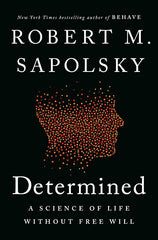
Robert Sapolsky and the Debate on Free Will
Share
The Maverick Neurobiologist: Sapolsky's Take on Free Will
Robert Sapolsky is not just another name in the vast world of neuroscience and biology. His illustrious tenure at Stanford University and a suite of groundbreaking studies have made him a beacon in the scientific community. A celebrated professor, primatologist, and neuroscientist, Sapolsky has a knack for dissecting complex concepts and presenting them with clarity and verve. His latest exploration into the nature of free will not only adds to his repertoire but has implications that stretch far beyond the walls of academia.

Sapolsk has recently stirred the academic and public arenas with the release of his new book. In it, he presents a compelling argument against the traditional concept of free will. Instead of perceiving our decisions as products of conscious choices, Sapolsky posits that they are outcomes shaped by a combination of our genetics, environment, past experiences, and even transient neurochemical states.
Much like how epilepsy was once misattributed to witchcraft or demonic possession, society's misunderstandings have often influenced how we treat individuals and understand phenomena. Today, when we discuss sleep science, we acknowledge the importance of factors like mattress firmness, room temperature, and ambient noise levels, all while ignoring the complexity of the individual sleeper’s neurobiology.
A MacArthur “genius” grant winner’s assertion that free will is a myth doesn’t just have philosophical or legal implications—it could also redefine the way industries, like the mattress industry, understand and appeal to consumers.
Why It Matters to the Mattress Industry
At first glance, the question of free will might seem distant from buying a mattress. But delve deeper, and one starts seeing correlations. If Sapolsky’s perspective holds true, then the decisions consumers make about which mattress to purchase aren’t entirely 'free.' They are shaped by a complex interplay of genetics, environment, past experiences, and even the minute chemical variations in our brains at the time of decision-making.
When a customer decides between a memory foam mattress or an innerspring one, the visible decision factors might include price, brand reputation, and comfort. Yet, if Sapolsky's theory is considered, one’s upbringing (like childhood associations with a particular mattress type), genetic makeup (a predisposition towards certain tactile stimuli), and recent exposures (maybe a compelling ad seen a week ago) all confluence to mold that decision, often outside conscious awareness.
The Age of Predictive Consumerism
Sapolsky's viewpoint may open the doors to an era of predictive consumerism. This isn't about predicting trends based on market analysis alone, but about delving into the very psyche of the consumer. By integrating knowledge from biology, psychology, and even sociology, businesses might predict with remarkable accuracy what a consumer will purchase next.
The potential here is vast. Could we reach a stage where, based on an individual’s experiences and genetics, we could predict their ideal mattress type, firmness level, or even their preferred bedding material? While this sounds like science fiction, the rapid advances in fields like machine learning and data analytics could make this a reality sooner than we think.
Ethical Landscapes and Challenges
While the opportunities are exciting, there are significant challenges ahead. The core idea—that our choices might not be truly ours—can be disconcerting. For industries, this presents both ethical and operational dilemmas.
Marketing campaigns tailored too closely to an individual's past experiences or neurobiology could be viewed as manipulative or invasive. There's a fine line between understanding consumers and exploiting them. Where does one draw the line?
Additionally, the idea of determinism could lead to apathy in consumers. If our choices are predestined, why put any effort into researching or selecting products? This might push industries to be more proactive and innovative in their approach to remain relevant and engaging.
A New Age of Consumer Relations
Embracing Sapolsky's perspective could lead to a more compassionate and understanding industry approach. Recognizing that customers' choices might be driven by factors beyond their conscious control could prompt companies to provide more flexible return policies or offer post-purchase support.
Beyond Mattresses - The Larger Implication of Sapolsky’s Theory

While mattresses provide a tangible example, the implications of Sapolsky's findings span far wider. Every decision, from the food we eat to the people we trust, is a blend of visible and hidden influences. Recognizing this complexity can foster a deeper understanding of ourselves and others, enabling greater empathy and insight.
Next time you find yourself debating between foam and springs, or any other choice for that matter, remember that your decision is a tapestry woven from countless threads — some visible, many hidden. Sapolsky's work invites us to delve deeper, to question the 'whys' behind our choices, and in doing so, to better understand the intricate ballet of biology, upbringing, and exposure that makes us uniquely human.